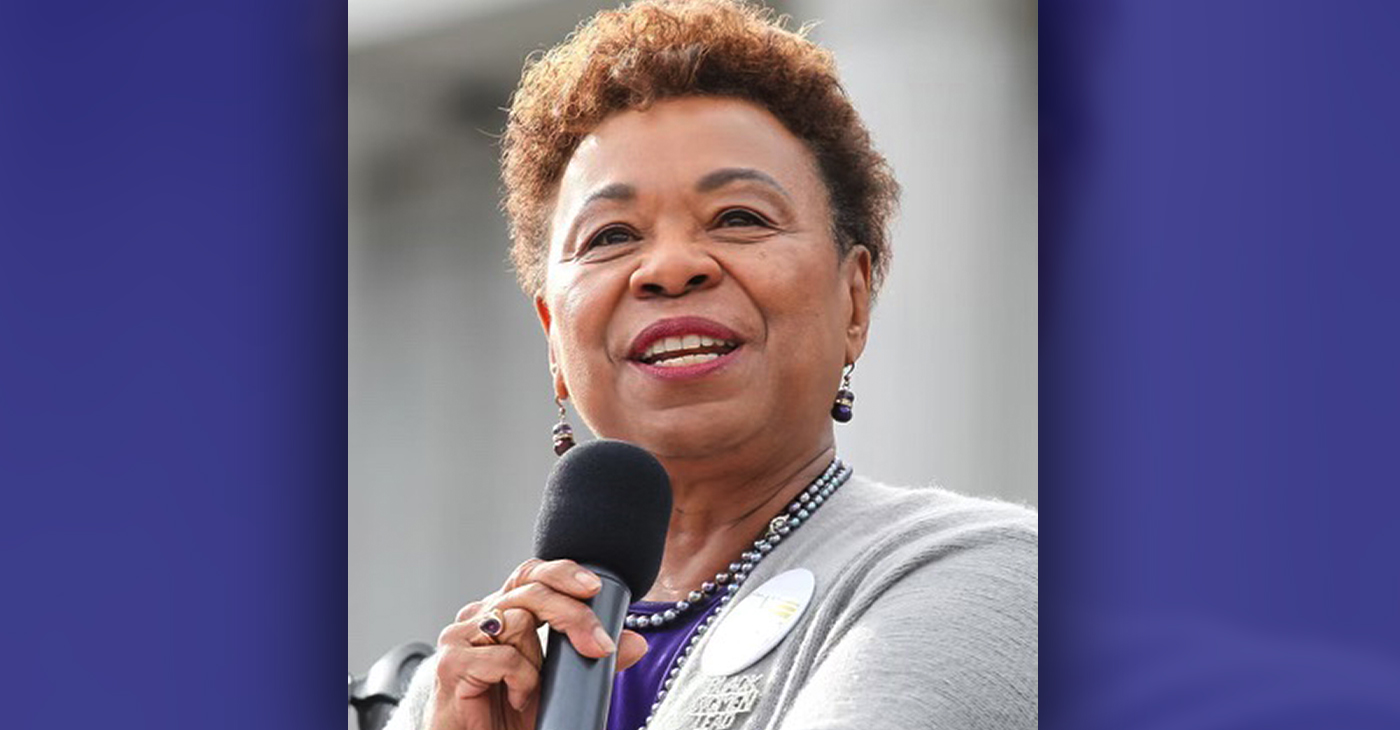Barbara Lee
IN MEMORIAM: Dr. Ruth Love, 90
Love’s interest in becoming a teacher began at an early age. She wanted to follow in the footsteps of her grandfather, Andrew A. Williams, who was a runaway slave at age twelve, and a teacher who founded the first school for African Americans in Lawton, Oklahoma.

By Dr. Martha C. Taylor
Ruth Burnet Love was born, on April 22, 1932, in Lawton, Okla., and passed away on June 2, 2022, in Oakland. As I reflect on the life and legacy of Dr. Ruth Love, her achievements, aptitude, and character, she cast a wide shadow that not only touched the lives of young people, she helped to shape them into achievers of excellency.
Dr. Love, the widely admired educator, lived a long life filled with quality for self and others. Love says life is a gift. “We all have an awesome responsibility not to waste time.”
She gave the highest and best we can give to life; the gift of self.
Dr. Love was the second of five children born to Alvin E. and Burnett C. Love, who migrated to Bakersfield, California during the 1940s. Love graduated from Bakersfield High School in 1950.
Love attended San Jose State University and received her Bachelor’s Degree in education in1954.In 1959 she received her Master’s Degree in Guidance and Counseling from San Francisco State University. In 1970, Love received her Ph.D. in Human Behavior and Psychology from the United States International University, San Diego.
Love’s interest in becoming a teacher began at an early age. She wanted to follow in the footsteps of her grandfather, Andrew A. Williams, who was a runaway slave at age twelve, and a teacher who founded the first school for African Americans in Lawton, Oklahoma.
In 1960 Dr. Love began her career in education as an adult education teacher with the Oakland Unified School District. Love became an exchange teacher sent to England in 1961. She also was a professor of education at San Francisco State University. Love was a counselor and consultant for a Ford Foundation project. She became a Fulbright Exchange Educator; participating in educational experiences in Ghana and England.
Dr. Love was a fierce advocate for underprivileged children during her career with Oakland Unified Schools District. She was appointed to several different positions as a consultant to the Bureau of Pupil Personnel Services and as Director of the Bureau of Compensatory Education from 1963 to 1965.
Love also served on the United States President’s Mental Health Commission and Board of Directors for the National Urban League from December 1962 until 1970. In August 1971, Love was chosen as Director of The Right to Read program with the U.S. Office of Health and Education in Washington, D.C. Following the assassination of Dr. Marcus Foster, the first African American Superintendent of the Oakland Unified School District, Dr. Love was appointed Superintendent from November 1975 until February 1981. Two of Love’s programs “Scholars and Artists” and “Face the Students” brought renowned achievers such as Alex Haley, Maya Angelou, James Baldwin, as well as Coretta Scott King to motivate and inform students.
Dr. Allie Whitehurst, an academic scholar worked with Dr. Love. She said Dr. Love provided the resources for teachers to continue their professional development to improve their teaching skills.
Congresswoman Barbara Lee honored Dr. Love, on April 23, 2015, in the House of Representatives. Lee saluted Dr. Love for a lifetime of service, “I will always remember the love, kindness, and caregiving Dr. Love provided her mother in spite of her busy schedule. She was an inspiration to me as I had the honor to care for my late mother in her golden years.”
Dr. Love continued her journey in higher academics and was appointed the first African American to serve as Superintendent for the Chicago Public Schools District from March 1981 until March 1985. In 1984 Dr. Love received an honorary Doctor of Literature degree from Atlanta University.
Love created and implemented the “Chicago Mastery Learning Program” during the 1981–82 school year. The program made it mandatory that all elementary school students’ reading and math courses be taught in more than one area, with students given an unlimited time to learn one area of the subject, and achieving eighty-five percent to be promoted to the next grade. Her proudest accomplishment was when the students reached the national norms on standardized tests.
In 1983, Love received the Horatio Alger Award and a Candace Award for Education from the National Coalition of 100 Black Women. She was named as one of 100 of the best school managers in North America by Educator Magazine in 1984.
The memory of the just is blessed…their works do follow them. Dr. Love left a memory that cannot be erased.
Barbara Lee
Congresswoman Barbara Lee Issues Statement on Deaths of Humanitarian Aid Volunteers in Gaza
On April 2, a day after an Israeli airstrike erroneously killed seven employees of World Central Kitchen (WCK), a humanitarian organization delivering aid in the Gaza Strip, a statement was release by Rep. Barbara Lee (D-CA-12). “This is a devastating and avoidable tragedy. My prayers go to the families and loved ones of the selfless members of the World Central Kitchen team whose lives were lost,” said Lee.

By California Black Media
On April 2, a day after an Israeli airstrike erroneously killed seven employees of World Central Kitchen (WCK), a humanitarian organization delivering aid in the Gaza Strip, a statement was release by Rep. Barbara Lee (D-CA-12).
“This is a devastating and avoidable tragedy. My prayers go to the families and loved ones of the selfless members of the World Central Kitchen team whose lives were lost,” said Lee.
The same day, it was confirmed by the organization that the humanitarian aid volunteers were killed in a strike carried out by Israel Defense Forces (IDF). Prior to the incident, members of the team had been travelling in two armored vehicles marked with the WCF logo and they had been coordinating their movements with the IDF. The group had successfully delivered 10 tons of humanitarian food in a deconflicted zone when its convoy was struck.
“This is not only an attack against WCK. This is an attack on humanitarian organizations showing up in the direst situations where food is being used as a weapon of war. This is unforgivable,” said Erin Gore, chief executive officer of World Central Kitchen.
The seven victims included a U.S. citizen as well as others from Australia, Poland, the United Kingdom, Canada, and Palestine.
Lee has been a vocal advocate for a ceasefire in Gaza and has supported actions by President Joe Biden to airdrop humanitarian aid in the area.
“Far too many civilians have lost their lives as a result of Benjamin Netanyahu’s reprehensible military offensive. The U.S. must join with our allies and demand an immediate, permanent ceasefire – it’s long overdue,” Lee said.
Activism
Rep. Barbara Lee, CBC Members, Raise Concerns Over Layoffs of Black Tech Workersi2s
In 2015, the CBC launched Tech 2020 to ensure that Black Americans would be better represented in the industry by 2020. However, Lee says those tech companies that pledged to be more inclusive are falling short of their promise.

By Post Staff
Democratic Congresswoman Barbara Lee and several other Congressional Black Caucus members have written a letter to Julie Su, the acting secretary of the U.S. Department of Labor, addressing the disproportionate layoffs of Black tech employees.
“We write to express our concerns with recent reports highlighting the impacts of widespread layoffs within the tech industry and its disproportionate impacts on the African American community and women,” the letter stated.
“Tech companies who previously agreed to address bias and discrimination and create greater opportunities in the workforce are now quietly defunding diversity pledges,” the letter continued.
In 2015, the CBC launched Tech 2020 to ensure that Black Americans would be better represented in the industry by 2020. However, Lee says those tech companies that pledged to be more inclusive are falling short of their promise.
Lee told the Grio, “We’ve been fighting for justice and for economic parity and security as part of the mission of the CBC,” she said, “and so when we established Tech 2020, it was about equity and inclusion.”
“Now with all the Supreme Court decisions and with all of the backsliding, especially by Republicans, it’s very important that we be very assertive in our fight for equity and justice within the private sector and public sector,” she said.
According to the letter, since the beginning of 2023, more than 240,000 tech workers have been laid off, more than 50% increase from 2022.
Lee found that minorities and women make up most of the tech layoffs that have occurred this year.
“If you don’t have African Americans developing content,” Lee said, “then we’re going to have Black people, Brown people [and] women disproportionately impacted.”
“This country is supposed to be a representative democracy where you include people, and you don’t discriminate against them,” she added. “When you see the disproportionate numbers of people being laid off, then that is a red flag that it could be discrimination occurring against these workers and employees.”
Activism
Congresswoman Lee Releases Statement on Vandalism of Lake Merritt Menorah

Congresswoman Barbara Lee (CA-12) released the following statement on the destruction of the large Menorah on display at Lake Merritt in Oakland:
“I’m deeply saddened and disheartened that the Lake Merritt Menorah was destroyed earlier this week. My heart and prayers go out to the Jewish community in Oakland, and I strongly condemn this vile act of antisemitism.”
“Oaklanders salvaged the menorah and gathered together (Wednesday evening) to celebrate its re-lighting, spreading love and support in the way only Oakland does. I’m proud of my constituents. We will not let hate win.”
-

 Activism4 weeks ago
Activism4 weeks agoOakland Post: Week of March 27 – April 2, 2024
-

 #NNPA BlackPress4 weeks ago
#NNPA BlackPress4 weeks agoCOMMENTARY: D.C. Crime Bill Fails to Address Root Causes of Violence and Incarceration
-

 #NNPA BlackPress4 weeks ago
#NNPA BlackPress4 weeks agoFrom Raids to Revelations: The Dark Turn in Sean ‘Diddy’ Combs’ Saga
-

 #NNPA BlackPress4 weeks ago
#NNPA BlackPress4 weeks agoCOMMENTARY: Lady Day and The Lights!
-

 #NNPA BlackPress4 weeks ago
#NNPA BlackPress4 weeks agoMayor, City Council President React to May 31 Closing of Birmingham-Southern College
-

 #NNPA BlackPress4 weeks ago
#NNPA BlackPress4 weeks agoBaltimore Key Bridge Catastrophe: A City’s Heartbreak and a Nation’s Alarm
-

 #NNPA BlackPress4 weeks ago
#NNPA BlackPress4 weeks agoBaltimore’s Key Bridge Struck by Ship, Collapses into Water
-

 #NNPA BlackPress4 weeks ago
#NNPA BlackPress4 weeks agoBeloved Actor and Activist Louis Cameron Gossett Jr. Dies at 87




















































